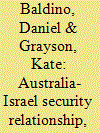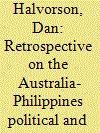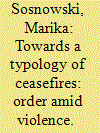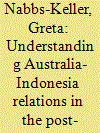|
|
|
Sort Order |
|
|
|
Items / Page
|
|
|
|
|
|
|
| Srl | Item |
| 1 |
ID:
175656


|
|
|
|
|
| Summary/Abstract |
While the Australia-Israeli relationship encompasses a cordial bilateral comradeship, it has not been without diplomatic skirmishes that have tested its reputation and strength. In particular, controversial intelligence liaisons coupled with recurring security-related scandals pose significant risks and challenges to Australian national interests. This article will explore the rationale, execution and hazards of the Australia-Israel intelligence relationship from an Australian perspective. When dealing with intelligence exchange across nations and information sharing with allies that might entail both formal and informal arrangements, it is argued that transparency and secrecy can co-exist when reconciled through robust, independent and well-resourced national oversight institutions. In an era of expanding globalisation of intelligence, targeted accountability advances that are adaptive to global trends may serve to mitigate the potential costs and downsides of transnational intelligence exchange while respecting the rights and liberties of citizens and ensuring that sovereignty, human rights standards and rule of law remain protected.
|
|
|
|
|
|
|
|
|
|
|
|
|
|
|
|
| 2 |
ID:
175653


|
|
|
|
|
| Summary/Abstract |
Wedging is an important strategy for China to disrupt potential countervailing response in its quest for regional hegemony. Yet, little has been known about how China pursues this strategy and the conditions for its success. This article contends that China has employed a combined statist and trans-state approach to wedge the U.S.-Australia alliance. Beijing has two main aims: promote an alignment of interest with Canberra at Washington’s expense and prevent Canberra from siding with Washington. It relies on three modes of influence (coercion, inducement and persuasion) to alter the costs and benefits of Canberra remaining aligned to Washington. The success of China’s wedge strategy is contingent on the use of policy compartmentalisation, the target’s regime type and the nature of its trans-state influence. China has achieved partial success in three issue areas: the South China Sea dispute, the U.S.-China 5G competition and the international isolation of Taiwan.
|
|
|
|
|
|
|
|
|
|
|
|
|
|
|
|
| 3 |
ID:
175650


|
|
|
|
|
| Summary/Abstract |
After more than 12 rounds of negotiations, at the 35th Association of Southeast Asian Nations (ASEAN) Summit and the third Regional Comprehensive Economic Partnership (RCEP) Summit held jointly in Bangkok, Thailand on 4 November 2019, India declared that it had decided to exit the RCEP. The RCEP is a proposed trade agreement between ASEAN and China, Japan, South Korea, Australia and New Zealand. The five countries have a free trade agreement (FTA) with ASEAN. The RCEP intends to increase trade and commerce by providing greater market access for countries that do not have FTAs with the bloc countries, providing investment opportunities for the bloc countries, reducing tariffs and other barriers and standardising customs rules and procedures. It will also help in setting up supply chains in the RCEP countries to export goods outside the bloc which will further enhance economic growth. The RCEP is the largest trading bloc in the world, larger than the European Union (EU) and the region covered by the US–Mexico–Canada trade agreement. It accounts for approximately one-third of the world’s population and one-third of the global gross domestic product (GDP).
|
|
|
|
|
|
|
|
|
|
|
|
|
|
|
|
| 4 |
ID:
175655


|
|
|
|
|
| Summary/Abstract |
After the Philippines gained independence in 1946, Canberra and Manila have maintained a close political and security relationship except for a period from the early-1970s to the mid-1990s. Despite this robust history of cooperation, the Australia-Philippines relationship is often overlooked in the study of Australia’s engagement with Asia. This article analyses the Australia-Philippines relationship from 1946 to the present. It argues that the trajectory of the relationship is shaped by strategic trends at the global level that impinge on the Asia-Pacific regional environment and engage the shared security interests of the two. Conversely, the relationship stagnates without this dynamic, as with the easing of Cold War pressures in Asia from the early-1970s. The article demonstrates that while Manila has consistently maintained a positive disposition toward Australia since its independence, Canberra has reciprocated only on its own terms—when Australia’s political and security interests have been sufficiently engaged.
|
|
|
|
|
|
|
|
|
|
|
|
|
|
|
|
| 5 |
ID:
175651


|
|
|
|
|
| Summary/Abstract |
There is no obvious end to the ongoing tragedy that faces the Muslim Rohingya communities of western Myanmar. Yet, with two important international legal cases underway at the International Court of Justice and the International Criminal Court there are now important opportunities to maintain pressure on Myanmar’s government. Myanmar’s current government – a fusion of militarist, democratic, ethno-nationalist and conservative interests – has consistently sought to downplay the seriousness of the situation. This attitude, and the fraught, but politically effective, nexus between Aung San Suu Kyi’s National League for Democracy (NLD) and the military, has done much to encourage a culture of impunity among military and civilian decision-makers. Nevertheless, with crucial national elections scheduled for November 2020, and an economy battered by the global COVID-19 shutdown, Myanmar faces a confluence of grave challenges. Under these conditions, key decision-makers in Naypyitaw may hope that international scrutiny of violence against the Rohingya will fade. Given these court actions, however, this is unlikely. Whatever sympathy we may have for Aung San Suu Kyi’s predicament, she will not recover her reputation. And she will forever face hard questions about her inability to prevent, and, more importantly, refusal to condemn, ethnic cleansing.
|
|
|
|
|
|
|
|
|
|
|
|
|
|
|
|
| 6 |
ID:
175652


|
|
|
|
|
| Summary/Abstract |
Unsurprisingly, most of the literature on the origins of the ANZUS alliance examines why the treaty came into existence in 1951, emphasising the role of John Foster Dulles, President Truman’s Special Representative, Dean Acheson, the Secretary of State, and Percy Spender, the Australian Foreign Minister. This paper takes a different approach. It focuses on the policy priorities of the Joint Chiefs of Staff (JCS) and argues that the JCS played an important, underappreciated role shaping the text and therefore the nature of the ANZUS treaty. Their coordinated intransigence within the interagency process—described by Acheson as a ‘sustained tantrum’—limited the geographic scope of ANZUS to the Pacific area and prevented Australian policymakers from gaining access to non-Pacific bodies such as NATO. Most importantly, the JCS limited the institutionalised depth of the treaty by preventing the Australian government from gaining access to the Pentagon’s global strategic planning. The policy priorities of the JCS in 1951, and their success at influencing the ANZUS agreement to reflect these priorities, holds enduring significance for the US-Australia alliance, which is simultaneously dominated by the two countries’ militaries yet hampered by underdeveloped mechanisms for policy formulation and institutionalised military cooperation.
|
|
|
|
|
|
|
|
|
|
|
|
|
|
|
|
| 7 |
ID:
175657


|
|
|
|
|
| Summary/Abstract |
Traditionally, ceasefires have primarily been seen as military tools used to halt violence for specific periods of time or as a teleological bridge between war and peace. Drawing from the literature on complex political order, this paper argues that rather than only affecting levels of violence ceasefires can be better conceptualised as particular types of wartime order and that consequently they can have diverse military and political consequences on the ground. These may include for recognition and legitimation, rebel governance, economic networks, state consolidation and rights to citizenship and property. The article uses this broader conceptual foundation and an analysis of 186 ceasefire agreements to create a typology with four different types of ceasefires and theorise about their potential ramifications for other contested areas beyond the military arena. It illustrates the different types of ceasefires from the typology with empirical examples from the Syrian civil war.
|
|
|
|
|
|
|
|
|
|
|
|
|
|
|
|
| 8 |
ID:
175654


|
|
|
|
|
| Summary/Abstract |
Attributing the tempestuous nature of Australia-Indonesia relations to marked cultural differences is almost an article of faith in Australian foreign policy analysis. Indeed, policy and media commentary tends to depict the bilateral relationship as frequently in crisis and at risk of irreparable damage. This article contends that constructs which characterise Australia-Indonesia relations as especially fragile overlook powerful strategic imperatives as a basis for ongoing cooperation. The article examines two key variables shaping Australia-Indonesia relations in the post-authoritarian era—resilience and respect. A perceived lack of consultation by successive Australian Governments on policy announcements of vital national concern to Indonesia has been a catalyst for repeated bilateral tensions in the post-authoritarian era. This has been compounded by important shifts in Indonesia’s post-authoritarian polity and the state’s rising significance in international economic and political terms. The article concludes that in spite of periodic bilateral tensions, Indonesia-Australia relations have remained surprisingly resilient. Such resilience is based on an appreciation by foreign policy elites in both states about the relationship’s utility for maintaining stability and prosperity in a transitional Indo-Pacific order.
|
|
|
|
|
|
|
|
|
|
|
|
|
|
|
|
|
|
|
|
|